Strategic Thinking - a primer
Strategic Interaction
The notion of strategic interaction is one of the core concepts for strategic thinking.
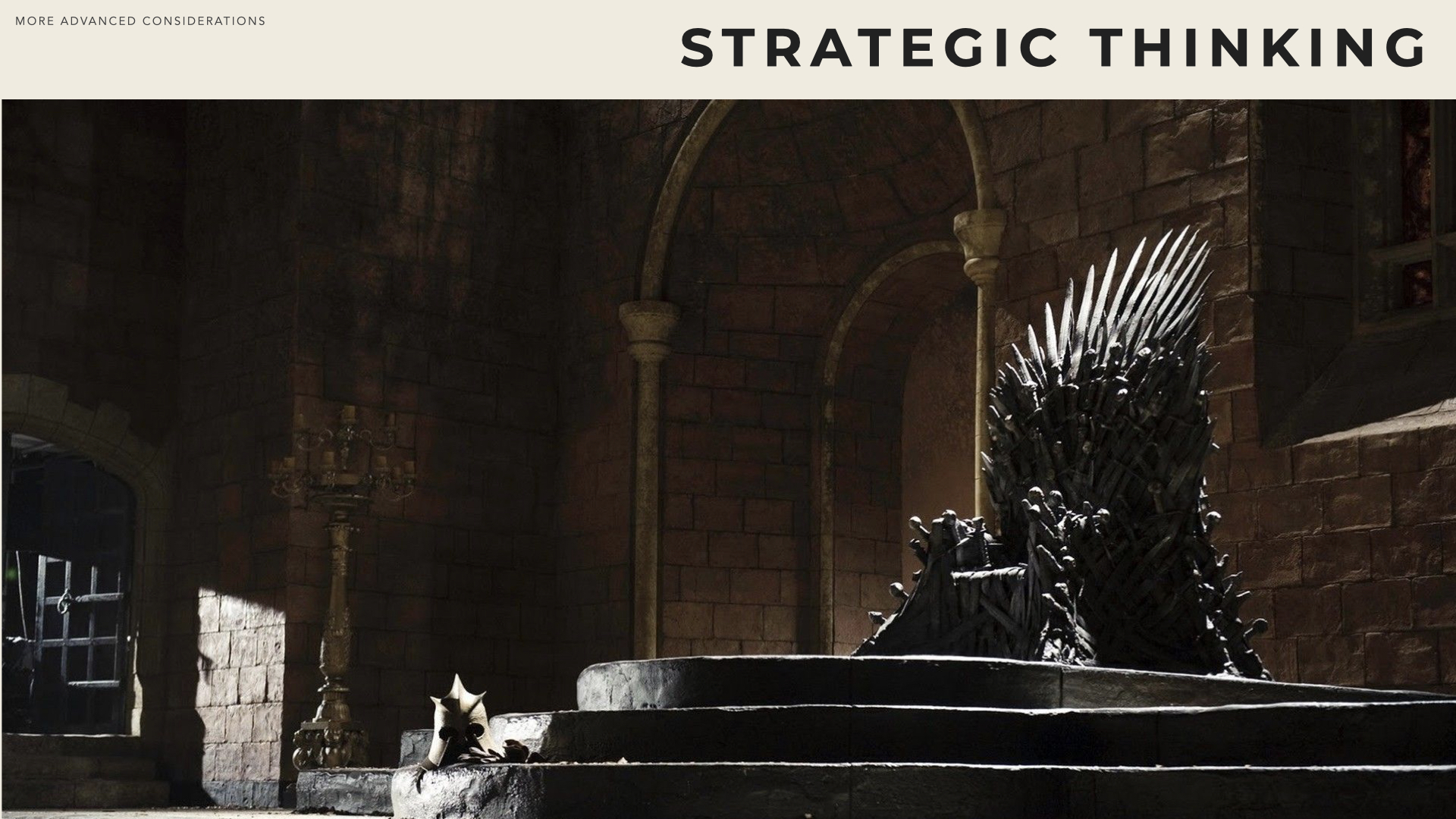
This notion can be rather complex and this section must be seen as a humble introduction to it.
When is an interaction becoming strategic?
Let’s assume there is a buffet and we all rush to the refreshments. As a consequence when the last two persons arrive there is only one cup of tea left. These two persons both have two options: either take or don’t take the tea.
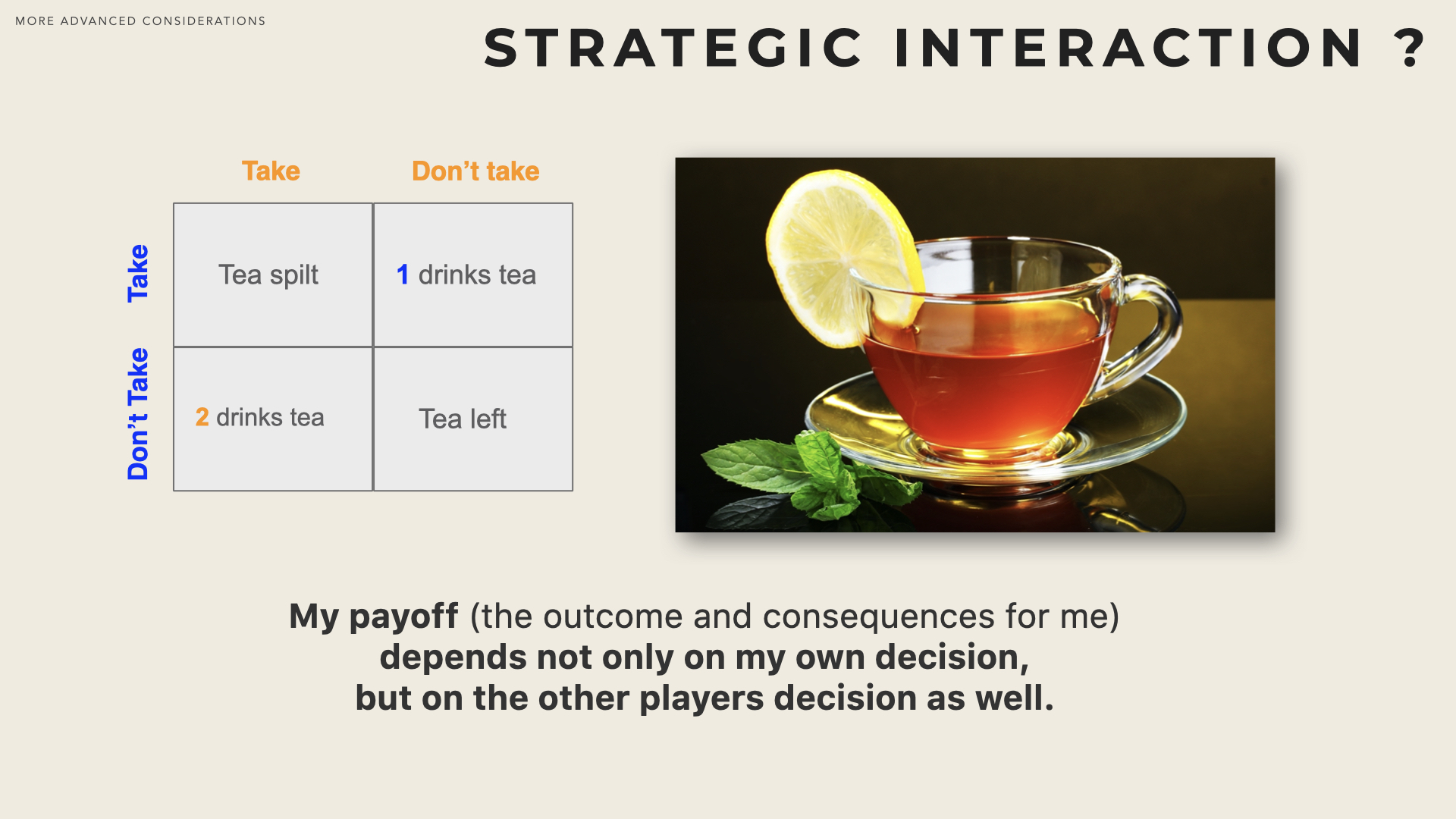
This can be represented by a table or matrix, where the rows correspond to one person’s actions and the columns to the other’s.
If they both take the tea it is likely to spill and will be lost for both, if neither take the cup, the tea will be left. Otherwise, one person will drink the tea.
What is key here is that the outcome for each person (his or her payoff) not only depends upon her/his own decision but as well on the other person’s decision.
The level of dependency is what matters
Likewise, it is important to note that if there were many cups of teas, this would no longer be a strategic interaction because whether or not one of the persons takes a cup of tea, would barely have any impact on the ability of the other person to have a tea.

In the above example, accessing the road is the strategic resource. When traffic is sparse, there is no (or very little) strategic interaction: a new driver can enter the road without impacting road accessibility for other drivers. By contrast when traffic is dense, any new on the road is impacting all the others.
The launch dilemma
Although the previous example is a toy version, it can apply to many real-life business situations.
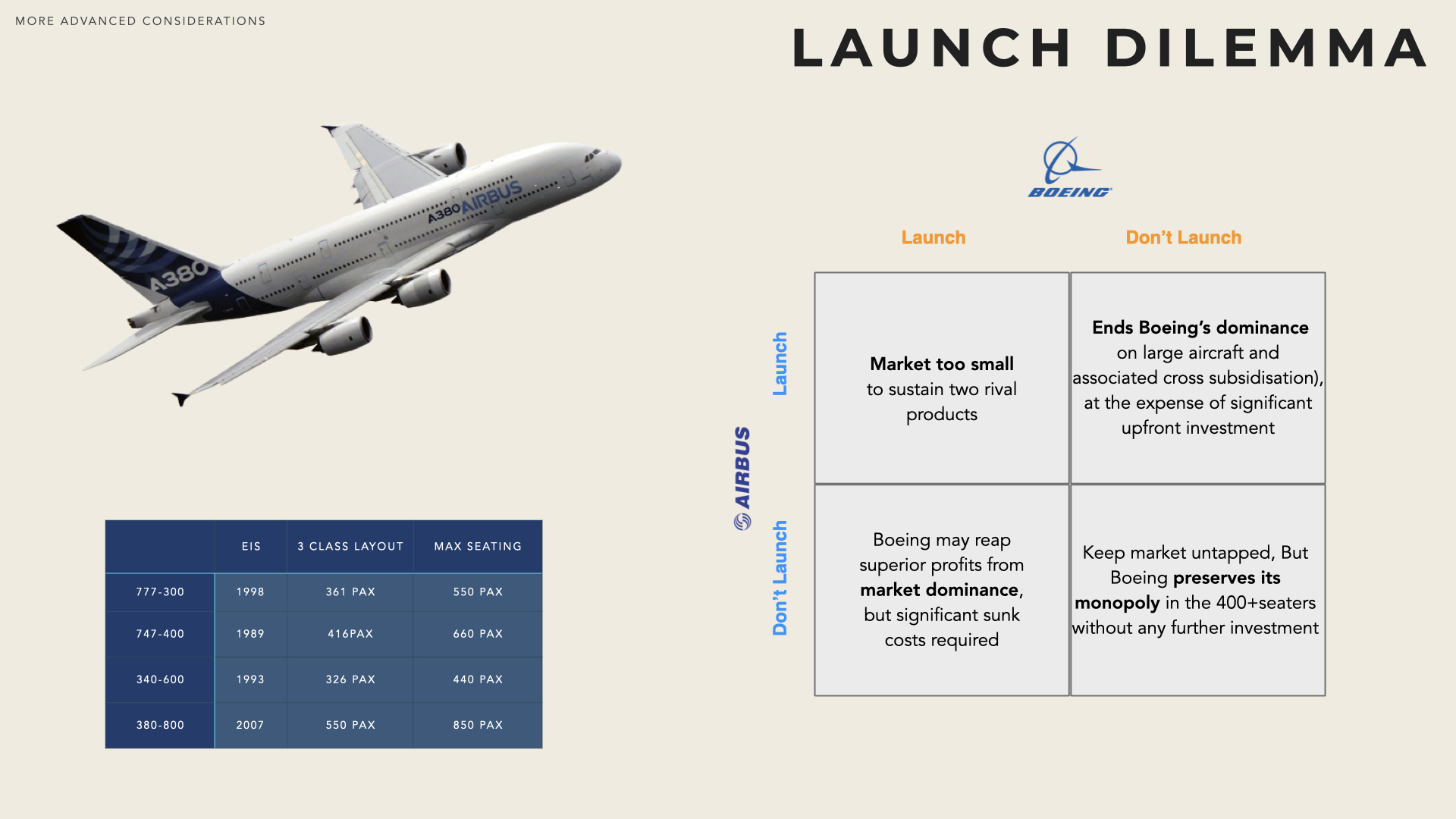
We’re in the late 90s, both Airbus and Boeing have worked on Very Large Aircraft projects, they even contributed to a joint feasibility study but it became obvious that Boeing was playing for time.
Airbus had announced its plan to develop its own aircraft, coined A3XX. The two players have the same two options: launch or don’t launch a Large Aircraft.
The market is too small to sustain two products and none of the players would breakeven their investments if both would launch. If none decide to launch the VLA market remains untapped, however, the situation is asymmetric as Boeing already dominate the 400+ seater market with the 747. Therefore Boeing has more interest than Airbus to maintain the status quo.
We know how it ended up: Airbus launched the A380 and terminated Boeing’s dominance on the upper segment. As a result, Boeing is phasing out its 747.
Learning Point
We all know we should Put ourselves in everybody else’s shoes but sometimes we tend to overlook some beliefs or consider that the situation is completely symmetrical where it is not.

The more you can consider a situation from the perspective of the other stakeholders, the better you can anticipate and make an educated decision.
Game Theory models strategic interactions
The model
The scientific field that studies strategic interactions is called Game Theory. Many books offer a good introduction to the subject if you want to dwell on this further ( [Dixit15] [Dixit08] ) .
For those who are thrilled by mathematical models and equations there are also many more advanced books ( [Myerson91] [Osborne16] [Tirole05] ) .
Game theorists consider that a strategic interaction – a game as they call it – is characterised by its PAPI:
- the Players (who hold stakes in the interaction),
- the Actions or options available to each player,
- the Information that is available,
- players’ Preferences or Payoffs for each combination of actions (action profile).
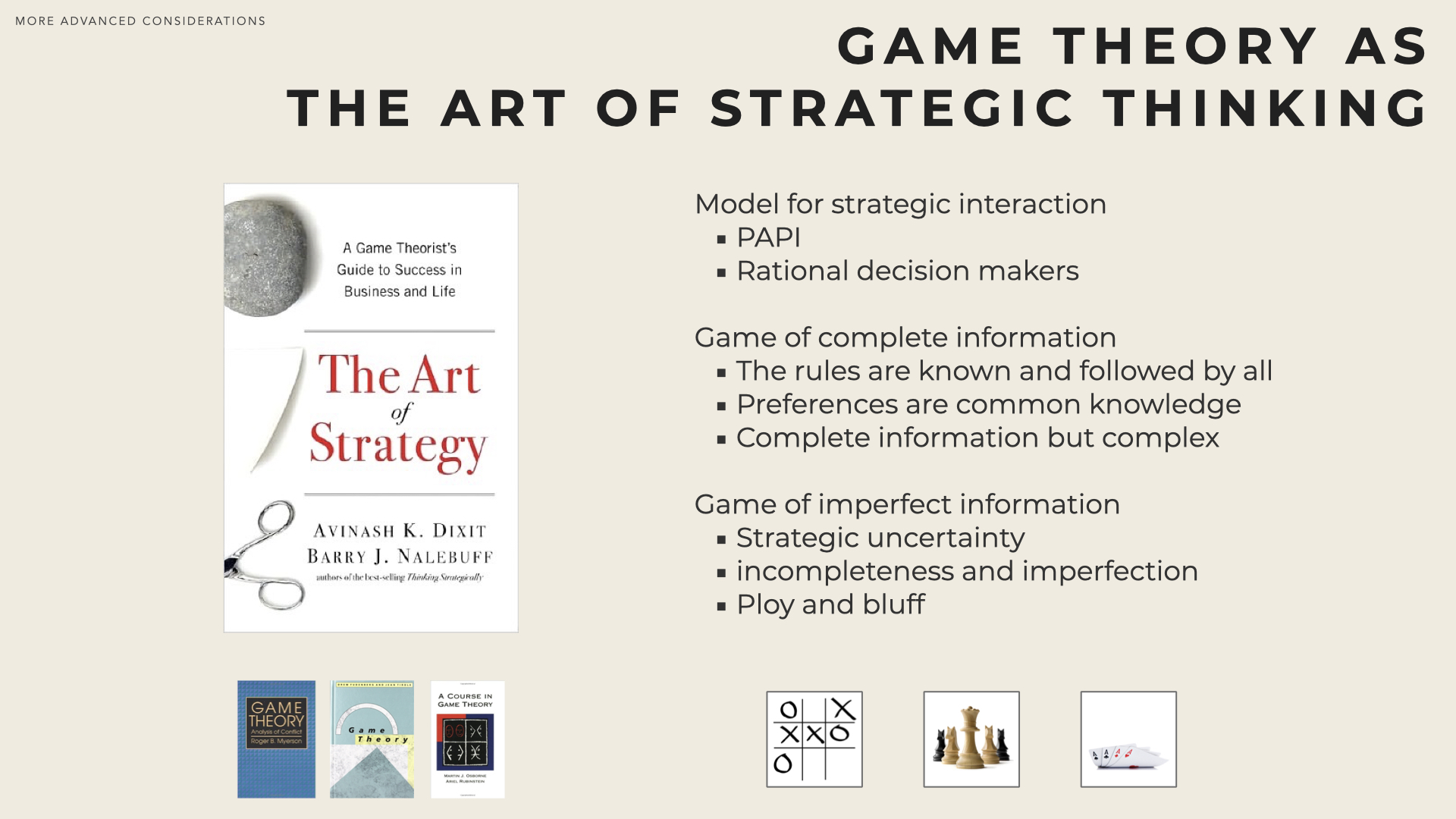
Perfection and completeness
Based on available information, a game can be complete / incomplete and perfect / imperfect.
In a game of complete information, the structure of the game (e.g. which actions are available) and the payoff functions of all players are known by everybody. Conversely in an incomplete game, at least some players keep some information private (typically their payoff function). Most true-life situations correspond to incomplete games.
In a game of perfect information, all the moves of all the players (including initial positions) are observable. In an imperfect game, some moves are hidden or are random.
A game of cards (e.g. Poker or Bridge) is a typical example of a game of complete information (rules and objectives are common knowledge) but imperfect information (player’s cards are hidden). Chess is a game of both perfect and complete information.
A game of incomplete and perfect information would be for instance, a ‘new game’ of chess where one opponent is not trying to win (in the conventional way) but to obtain a certain arrangement of pieces. Games of incomplete information can be converted into games of complete but imperfect information.
In theory, optimum solutions (or equilibria) exist for any game of perfect and complete information. However, you may face situations where although the information is complete, the game is too complex to be solved (a canonical example would be chess).
Backward Reasoning
Game theory proposes several concepts of solutions (i.e. how to solve a game). One of these concepts is Looking forward and Reasoning Backward
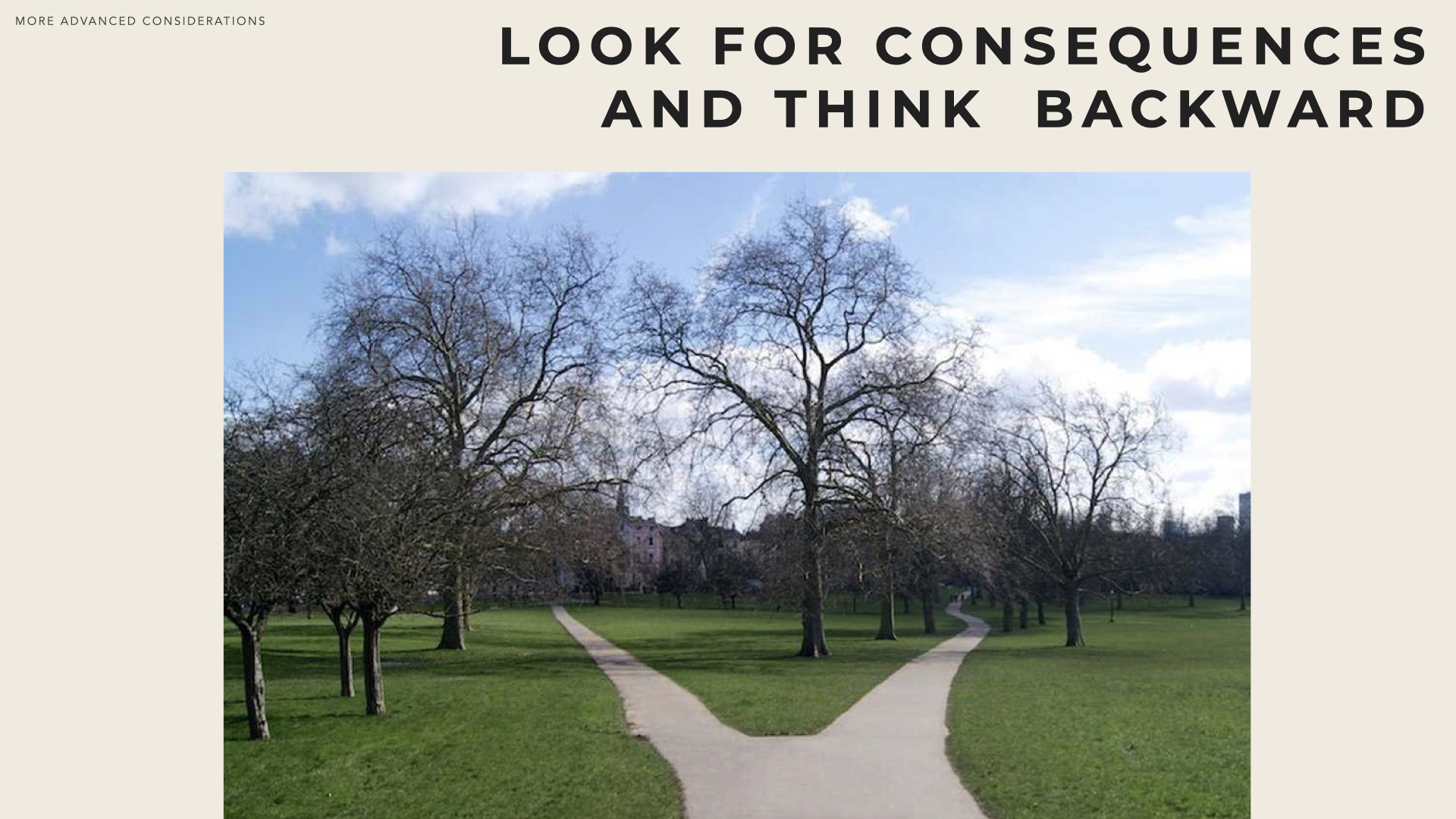
Essentially it consists in anticipating (looking forward) all potential sequences of moves (player 1 does this, then player 2 does that, then player 1 does this, etc.. ) and consider the corresponding outcomes.
Based on the various potential outcomes and how much they are desirable to each player, one can eliminate the actions that lead to non-favourable outcomes, starting from the last moves (backward reasoning).
Applied to Strategic management, Backward reasoning promotes a way of thinking where companies do not focus on their next move only. Indeed, a company’s decision is likely to trigger reactions from its environment (competitors, complementors, customers, suppliers) which may lead to the company to update/refine its decision. Anticipating the sequence of moves can help make the best decision right from the beginning or even sometimes, force favourable moves from the environment.